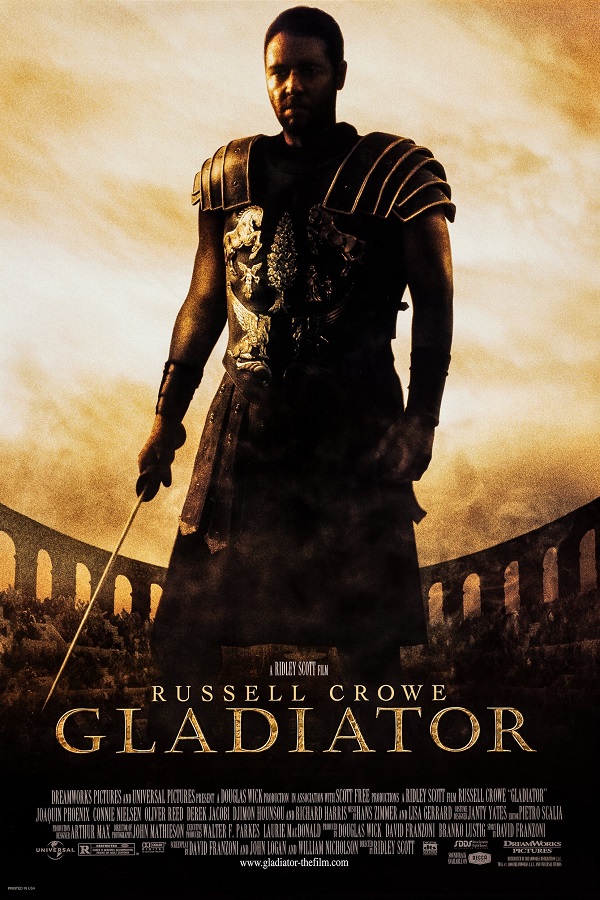
The unnecessary (and likely awful) upcoming sequel to Ridley Scott’s Gladiator put me in mind to watch the original film as it had been quite a few years since my last viewing. I remember Gladiator‘s theatrical release quite vividly as I was in High School and it was one of the biggest films over those years that is still thought of highly today. For someone of my age, it was a great few years for films with the new (but disappointing), Star Wars prequel trilogy, the X-Men film adaptations, The Matrix in 1999 and Peter Jackson’s The Lord of the Rings trilogy beginning in late 2001. Apart from all the gross-out teenage sex comedies, these were the most notable films of the period and Gladiator still holds up very well.
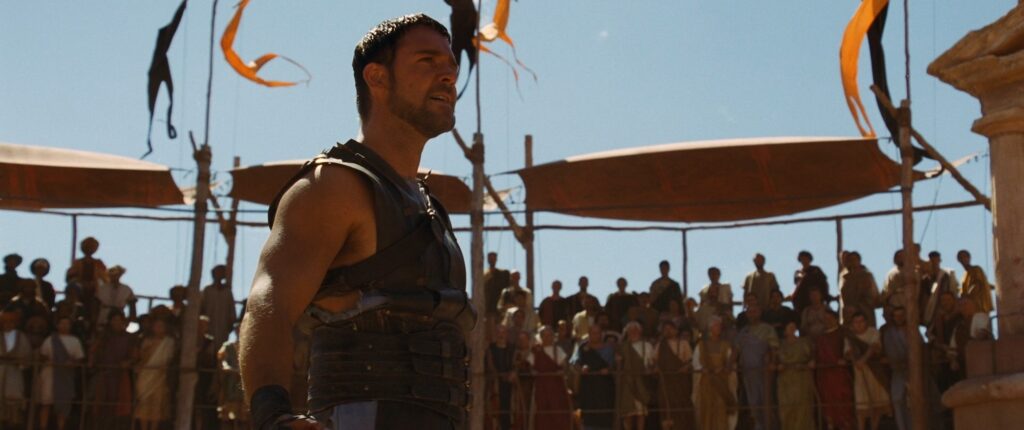
It cemented Russel Crowe as a leading man and was the breakthrough film for Joaquin Phoenix though like Crowe, he had already been appearing in films throughout the 1990s. Crowe won an Oscar for Best Actor for his performance in this and though he was great, Phoenix somewhat stole the show with his portrayal of the deranged patricidal Commodus; for which he was nominated for Best Supporting Actor. If you wanted to single out a film for Crowe’s best performance, I wouldn’t pick this though he is as always, very good. Interestingly, Phoenix was overlooked for Best Actor until Joker in 2019 which was a good deal longer than Crowe. Finally, it has the distinction of being a film that was popular with critics and audiences and actually won for Best Picture too. Ridley Scott was nominated for Best Director and still has never won despite being one of the best living directors. I refer to my 2021 post on the irrelevance of these awards with regards to choosing significant films which can be extended to Best Actor, Actress and Director nods too.

Before getting to the film, it is worth discussing the director Ridley Scott for a bit longer. The last time I mentioned him was in my review of Blade Runner and at some stage I will have to review Black Hawk Down which came out in 2001. Although I do think he is a great director, I don’t like a lot of his films and view the aforementioned films as his best with 1979’s Alien also deserving a mention. His brother Tony, though admittedly not as talented, had a better ratio of good to bad films in my opinion with Top Gun, Crimson Tide and Man on Fire being among his best. As I unashamedly tend to prefer popcorn flicks, you can take that opinion for what it is.
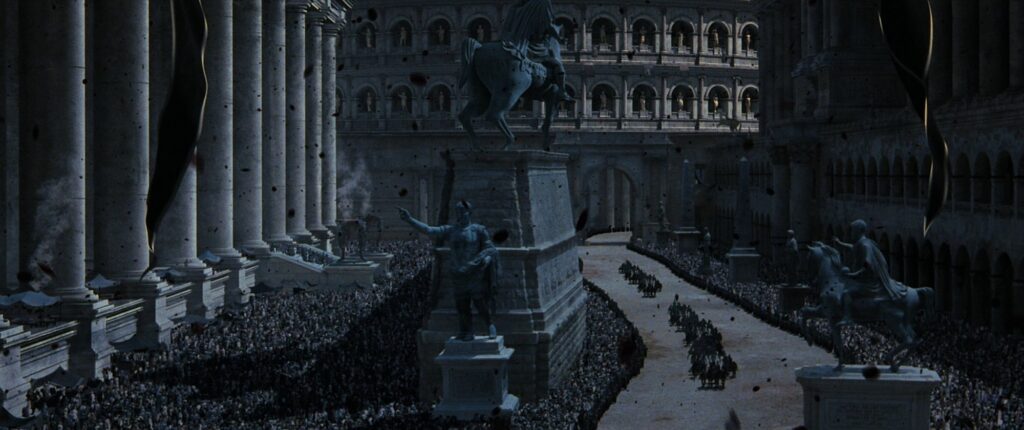
I should also mention that in my review of Top Gun I was similarly dismissive of the then upcoming sequel Top Gun: Maverick which did turn out to be a great film. If I turn out to be wrong about Gladiator II, I will at some point come and say so.
Gladiator is quite similar in formula to 1995’s Braveheart which was also a successful film with both critics and audiences that won a number of Academy Awards. The similarities go further though as it also has a number of historical errors and anachronisms though these are not so outrageous as many of those found in Braveheart. This can be seen in the famous opening battle of the film with a Roman army using siege equipment to destroy trees in a German forest. It also follows with what I assume is an unlikely use of cavalry within the same forest. With this in mind, it is much more satisfying to take the historian’s hat off for this film as it is quite entertaining and one can hardly expect much accuracy from Hollywood no matter how well-documented the subject.

It is set during the reign of Emperor Marcus Aurelius which was arguably also at the height of Roman Imperial power. Aurelius (Richard Harris), his daughter Lucilla (Connie Nielsen) and his son Commodus (Phoenix) appear as characters although the real Aurelius had more children than this. The main complication of the film comes after the opening battle when Maximus (played by Crowe), is asked to step in as a caretaker to return Rome to a Republic when the aging Aurelius dies. He doesn’t believe his immoral and cowardly son should succeed him and so asks Maximus to rule. Commodus, on learning this, murders his father and when Maximus refuses to acknowledge him as the new Emperor, he is arrested and taken out of the camp to be executed. Commodus’ sister Lucilla though suspecting his involvement in their father’s death, coldly accepts his ascension. Maximus manages to kill his would-be executioners and escape but not in time to save his wife and son from soldiers sent to end his transitional dynasty before it starts. This leads after some aimless wandering, to his being picked up as a suspected deserter by slavers and sold in North Africa to a slaver named Proximo (played by Oliver Reed who also died during production). It is here that he becomes the titular gladiator and his experience and ability in combat sees him quickly rise in popularity until he is brought to fight at the Colosseum in Rome. This finally brings him before the now Emperor Commodus who has taken everything from him but his life. He is then able to use his popularity among the people to weaken Commodus and ultimately challenge his power.

There are some aspects of the plot which fit with the historical record. The real Commodus did enjoy gladiatorial games and even fought in them. Marcus Aurelius was considered a great emperor and also known for his stoic philosophy he summarised in his Meditations; which remains well-worth reading. He didn’t want to restore the Roman Republic and was not murdered by his son who was set to succeed him before he died. Commodus was certainly a megalomaniac though and was assassinated in his bath at the age of thirty one. The biggest criticism I have about Gladiator is not that it got these things wrong but that it bothered to include any historical characters at all. As only three of the main characters are historical figures and the film contradicts their actual lives, it would have been preferable to have given them different names. The audience would not have cared and it would have provoked less groans from historians whether armchair or professional. But once again, this is a Hollywood production.

Apart from the above, I generally have only minor quibbles with the film as a whole. It did occur to me on the most recent viewing that it was odd for Maximus to refuse to accept Commodus as Emperor given that Aurelius was clearly dying from his first appearance. The characters wouldn’t have had any reason to suspect foul play given he was feeble, travelling in winter and gave every indication that he expected to die soon. Only the audience sees Commodus’ combined act of patricide and regicide. It does work given that Maximus had reluctantly promised to carry out the Emperor’s wishes though they were known only to Maximus after Commodus murdered Aurelius. Given Maximus was also a highly decorated and successful General in the Roman Army, it wasn’t very tactful to behave as he did before the body had even gone cold. Still, it was perhaps necessary for the film’s pacing.
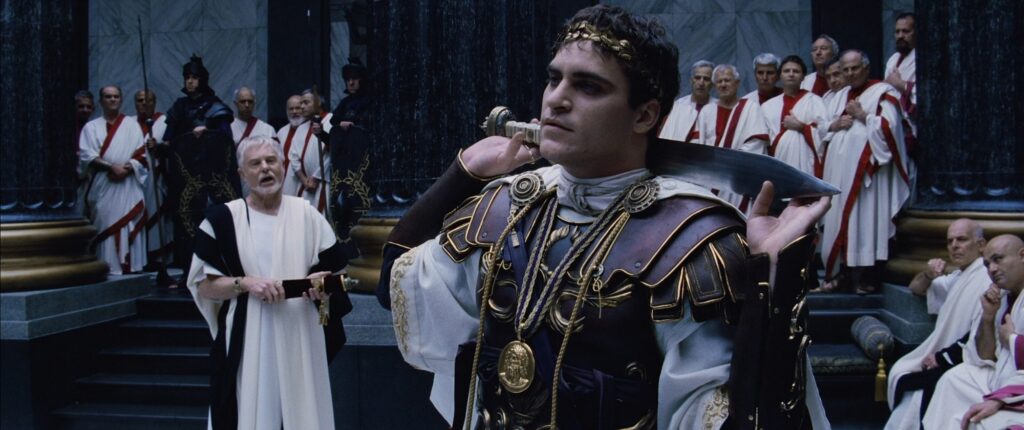
None of the above really hurts the film as the revenge plot does most of the narrative heavy lifting and Maximus is an immediately sympathetic character. From the film’s beginning he is shown to be a competent and brave leader who is popular and respected among his men and is seen in the thick of combat with them. He is also shown to be humble; being unambitious and desiring to retire to his own lands with his young family. His personal humility is further shown in his piety, as he takes the time at multiple points to pray as well as his ritualistic act of rubbing dirt between his hands before battle. This aspect is reinforced in one of the most recognisable lines from the film’s opening, “Brothers, what we do in life… echoes in eternity.” After the loss of his family, there are also multiple dream sequences of an afterlife which also sets up the sad but ultimately very satisfying ending.
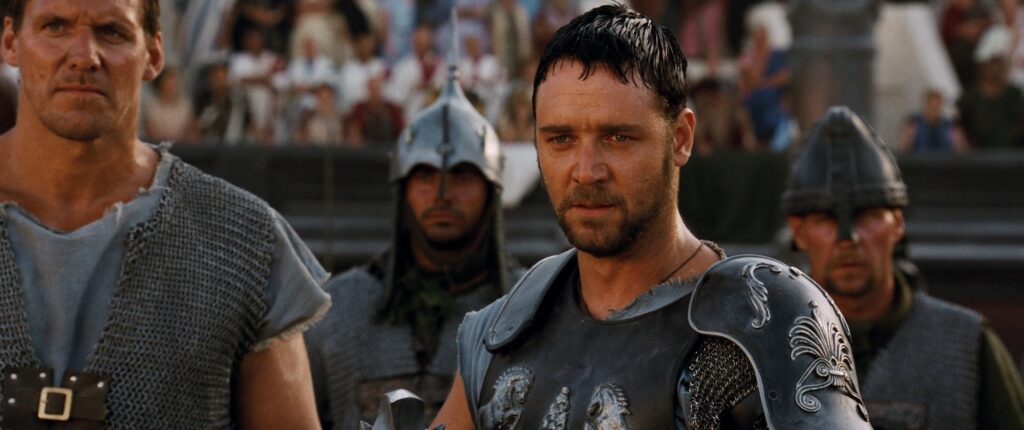
The other major appeal are the gladiatorial battles themselves. This is a good example of where your memories can fool you because I remembered there being a lot more of these than there actually are. It also takes a very long time before these begin and it isn’t until halfway through the film’s lengthy running time that the first battle in the Colosseum occurs. These are certainly violent and not for the squeamish but one has to remember while watching that many Romans were enthusiastically cheering on real people being slain and not the simulation shown on film. I normally avoid any media that is deliberately gratuitous but it all but necessary here to show the savagery of the arena. The highlight is certainly the first in Rome where Maximus and his fellow gladiators turn one of Rome’s historical victories into a savage and bloody counter-factual. The next big battle before the finale sees Maximus going one on one with a retired champion with chained tigers at the boundary keeping the one-on-one battle interesting.

The wonderful costumes, still-impressive visual effects, talented direction and performances all make Gladiator a memorable film. This is all grounded in what is otherwise a simple story of one man seeking vengeance for what another has done to him. The film does include the political intrigues that are a staple of narratives set in Roman times but this only makes the pure desire for justice of Maximus all the more appealing. Even his clandestine allies within the Senate and noble classes are shown to be somewhat compromised and few characters outside of Maximus are objects of sympathy for the audience. Though it is hinted from early in the film that Maximus and Commodus’ sister Lucilla will form a relationship, the death of Maximus after defeating Commodus in the arena makes for a much better ending. That he will join his family in the afterlife is also foreshadowed early on. The first time watching it, one expect it to go either way but his death makes for a better though bittersweet ending and I’m glad they went with it.

This was mostly written with the assumption that readers have seen the film but if you haven’t, I don’t think I will have spoiled any potential enjoyment. This remains one of my favourite films. Despite the many historical inaccuracies, it is still one of the best films about Ancient Rome and I’m not sure you could get a much better representation of the evil spectacle that was the Roman Colosseum. After following with Black Hawk Down the following year, Ridley Scott has not since matched or even come close to his work with Gladiator. Kingdom of Heaven was enjoyable but nowhere near as memorable and given the setting, was heavy with the anti-Christian element evident in many of his other films. I have not seen all his films that followed but of all, only The Martian came close and that was probably more thanks to the novel it is adapted from. I have not yet seen his most recent Napoleon biopic but judging by reviews, his commitment to historical accuracy hasn’t improved with age. Whether the upcoming sequel to his best films will see a genuine return to form remains to be seen.
